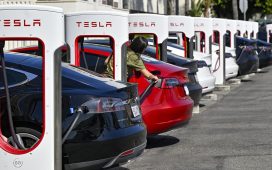BEIJING — The Chinese port city of Tianjin, one of the world’s busiest transfer points for cargo, began a new round of testing of 14 million residents on Wednesday to contain the Omicron variant, as analysts warned of the growing economic costs to China of curbs to extinguish clusters of coronavirus infections.
Volkswagen Group, the largest foreign automaker in China, has shut a plant it jointly runs with FAW Group in the city, as well as a components factory, due to recent COVID-19 cases there.
“Due to the recent COVID-19 outbreaks both the FAW-VW vehicle plant and VW Automatic Transmission Tianjin component factory have been shut down since Monday,” a spokesperson told Reuters.
“Both plants have conducted COVID -19 testing twice for all employees this week and are waiting for the results. We hope to resume production very soon and catch up with lost production. The top priority remains the health and well-being of our employees.”
Toyota Motor Corp. said operations at its joint-venture in Tianjin, which has annual production capacity of 620,000 vehicles, had been halted since Monday due to the impact on suppliers of mandatory COVID-19 testing of city residents.
“We plan to resume operations as soon as the government’s instructions and the safety and security of the local community and suppliers are confirmed and assured,” Toyota said in a statement.
China, which has stuck to what is effectively a “zero-COVID” policy, is scrambling to prevent the spread of the highly infectious Omicron variant ahead of the Lunar New Year travel season later this month – and as Beijing prepares to stage the Winter Olympics beginning Feb. 4.
Tianjin, in northern China around 100 km (62 miles) from the capital Beijing, reported 41 domestically transmitted infections with confirmed symptoms on Wednesday, up from 33 a day earlier, data from the National Health Commission showed on Thursday.
The VW Group assembly plant builds the Audi Q3 crossover alongside VW models for the local market, according to a company website.
China is likely to see ramped-up restrictions to contain Omicron, Goldman Sachs analysts said in a note revising down their 2022 growth forecast to 4.3 percent from 4.8 percent previously, citing economic costs from the potentially intensified measures.
Analysts at Morgan Stanley also said they saw downside risk to their first-quarter growth forecast for the world’s second largest economy this year, as Omicron could “imply more costs than benefits under China‘s COVID-zero strategy”.








